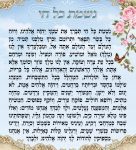Did Peter the Apostle author Nishmat? – Ask the Rabbi
Q. I heard that the lyrical poem Nishmat (recited on Shabbat and festivals) was authored by Peter, the leader of the Apostles. Could this be true?
 A. Shabbat and the festivals have a longer Shacharit service than weekdays, and the number of psalms we read is expanded on Shabbat and chagim.
A. Shabbat and the festivals have a longer Shacharit service than weekdays, and the number of psalms we read is expanded on Shabbat and chagim.
On all occasions the Pesukei DeZimra (passages of song – i.e. psalms) conclude with Psalm 150, with its call to the whole world, Kol HaNeshamah Tehallel Y-ah – “Let all breath praise the Lord”.
On Shabbat and festivals, the words and theme are continued with Nishmat Kol Chai, which is known as Birkat HaShir, the Song Benediction. It avers that however much we try (“even if our mouths were full of song”), the Creator is beyond all human praise.
Nishmat has three parts, which say:
· There is only one God (“We have no King but You”).
· His greatness is beyond human praise.
· He has cared for His people throughout their history.
The authorship of the passage is controversial. There is a medieval legend that the first section is by one of the most “Jewish” of Jesus’ supporters, Simon Peter, who is thought to have been disconcerted by the way the early Christians made compromises with Jewish monotheism.
The claim that he wrote part of Nishmat is rejected by Rashi (Machzor Vitry, p. 282), who argues that the real author is Shimon ben Shetach and that the legend confused two Simons. Rashi’s grandson Rabbenu Tam still believes that this Simon was a Jewish liturgical poet and wrote a Yom Kippur hymn, Etein Tehillah (“I will utter praise”).
Some liturgists think that Simon Peter also wrote the benediction Ahavah Rabbah (“You loved us with exceeding love”) which precedes the morning Shema, but this too is highly improbable.
Some midrashic passages suggest that (like some other early Christians) Simon Peter hovered between Judaism and Christianity and ended up as a Jew who attempted to prevent Christians from changing Jewish belief and practice. This is one of a number of stories of apostates (even a pope) who left Christianity and returned to Judaism.



